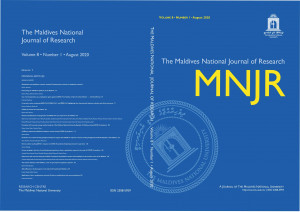Abstract
The aim of the study is to assess the knowledge, attitude and practices regarding leprosy. A cross sectional survey of a nationally representative sample was implemented among the resident adult population (18 years and above) across the islands of Maldives. The survey sample size estimated was 1181 and a total of 1024 respondents completed the survey accounting for a response rate of 86.7%. The questions to measure indicators of knowledge, attitude and practices regarding leprosy were adopted from existing validated instruments used for leprosy KAP studies. The findings show a low level of knowledge with a mean of 3.5 in the KAP measure, where the maximum score is eight. However, the attitude and practices score does not indicate a high level of negative attitudes and practices (below the mid-point). The mean score of EMIC-CSS is 12, slight inclination towards less negative attitudes (EMIC-CSS scale scores ranges from zero = no negative attitudes, to 30 = most negative attitudes). The mean score of SDS is 8.9 indicating moderate level of negative practices (SDS scale scores ranges from zero = no negative practices to 21 = most negative practices). As Leprosy in the Maldives is no longer a public health burden, and the disease prevalence is extremely low, it has created a situation where there is very little awareness and correct knowledge about the disease among the public as well as health care workers. The attitudes and practices from the family and community are not at alarming levels in terms of stigma and social distancing. However, the low level of knowledge raises the concern that cases may be missed and as patients may be missed as they may not seek healthcare for early diagnosis and treatment
References
Bajaj, D. R., Matlani, B. L., Soomro, F. R., & Iqbal, M. P. (2009). Knowledge, attitude and practices regarding Leprosy among general practitioners at Hyderabad. Journal of College of Physicians Surgeons Pakistan, 19(4), 215-8.
El Hassan, L. A., Khalil, E. A. G., & El-Hassan, A. M. (2002). Socio-cultural aspects of Leprosy among the Masalit and Hawsa tribes in the Sudan. Leprosy Review, 73(1), 20-28.
Global Partnership for Zero Leprosy. (2019). Program profile: Maldives. Retrieved from https://zeroLeprosy.org/program-profile-maldives/
Haverkort, E. T., & van ‘t Noordende, A. (2022). Health workers’ perceptions of Leprosy and factors influencing their perceptions in endemic countries: A systematic literature review, Leprosy Review, 93 (4), 332-347; DOI: 10.47276/lr.93.4.332
Health Protection Agency [HPA] (2021). National Leprosy Management Guideline. Maldives. Male’, Maldives: Ministry of Health.
HPA, & World Health Organisation [WHO]. (2021). National Leprosy Program, Maldives Interruption of Transmission, Elimination of Disease. Retrieved from https://www.who.int/docs/default-source/ntds/Leprosy/global-consultation-on-global-Leprosy-strategy-2021-2030/19-elimination-maldives.pdf
HPA, Ministry of Health [MoH] & WHO (2019). Framework for zero Leprosy in the Maldives. Male’, Maldives: Ministry of Health.
Kaehler, N., Adhikar, B., Raut, S., Marahatta, S. B., & Chapman, R. S. (2015). Perceived stigma towards Leprosy among community members living close to Nonsomboon Leprosy Colony in Thailand. PLoS One, 10(6), e0129086.
Ministry of Health (2020). Maldives health profile 2019. Male’, Maldives: Ministry of Health. https://health.gov.mv/Uploads/Downloads/Publications//Publication(111).pdf
Myint, T., Thet, A. T., Htoon, M. T., & Win, M. (1992). A comparative KAP study of Leprosy patients and members of the community in Hlaing and Laung-Lon townships. Indian Journal of Leprosy, 64(3), 313-324.
National Bureau of Statistics [NBS]. (2021). World population day 2021. http://statisticsmaldives.gov.mv/nbs/wp-content/uploads/2021/07/WPD-2021.pdf
Peters, R. M., Van Brakel, W. H., Zweekhorst, M. B., Damayanti, R., & Bunders, J. F. (2014). The cultural validation of two scales to assess social stigma in Leprosy. PLoS Neglected Tropical Diseases, 8(11), e3274.
Rensen, C., Bandyopadhyay, S., Gopal, P. K., & Van Brakel, W. H. (2011). Measuring Leprosy-related stigma: A pilot study to validate a toolkit of instruments. Disability and Rehabilitation, 33(9), 711-719.
Riccò, M., Vezzosi, L., Ranzieri, S., Balzarini, F., Mezzoiuso, A. G., & Vaccaro, F. G. (2020). Understanding Leprosy in a nonendemic area: A pilot study on knowledge, attitudes, beliefs of medical professionals from North-Western Italy. Acta bio-medica: Atenei Parmensis, 91(4), e2020187. https://doi.org/10.23750/abm.v91i4.8810
Steinmann, P., Dusenbury, C., Addiss, D., Mirza, F., & Smith, W. C. S. (2020). A comprehensive research agenda for zero leprosy. Infectious diseases of poverty, 9(1), 156. https://doi.org/10.1186/s40249-020-00774-4 van‘t Noordende, A. T., Korfage, I. J., Lisam, S., Arif, M. A., Kumar, A., & van Brakel, W. H. (2019). The role of perceptions and knowledge of Leprosy in the elimination of Leprosy: A baseline study in Fatehpur district, northern India. PLoS Neglected Tropical Diseases, 13(4), e0007302.
van’t Noordende, A. T., Lisam, S., Ruthindartri, P., Sadiq, A., Singh, V., Arifin, M., ... & Korfage, I. J. (2021). Leprosy perceptions and knowledge in endemic districts in India and Indonesia: Differences and commonalities. PLoS Neglected Tropical Diseases, 15(1), e0009031.
Wijeratne, M. P., & Østbye, T. (2017). Knowledge, attitudes and practices relating to Leprosy among public health care providers in Colombo, Sri Lanka. Leprosy review, 88(1), 75–84.
World Health Organisation [WHO]. (2016). Global Leprosy Strategy 2016–2020. https://apps.who.int/iris/rest/bitstreams/1091054/retrieve
World Health Organisation [WHO]. (2019). Global Leprosy Situation Current situation-2019. https://www.who.int/docs/default-source/ntds/Leprosy/global-consultation-on-global-Leprosy-strategy-2021-2030/04-current-global-Leprosy-situation.pdf
World Health Organisation [WHO]. (2021). Leprosy (Hansen’s disease). Retrieved from https://www.who.int/news-room/fact-sheets/detail/Leprosy
